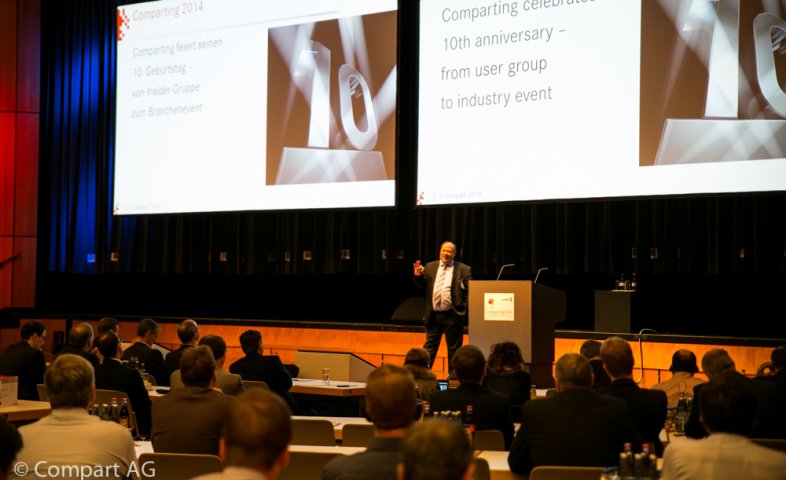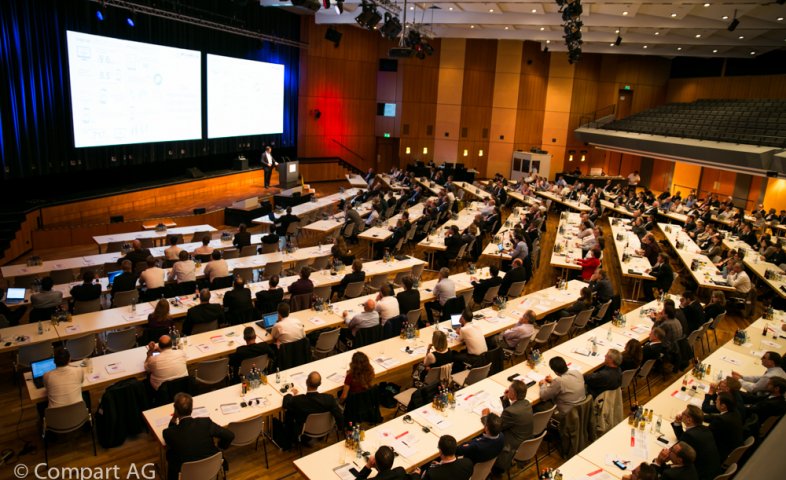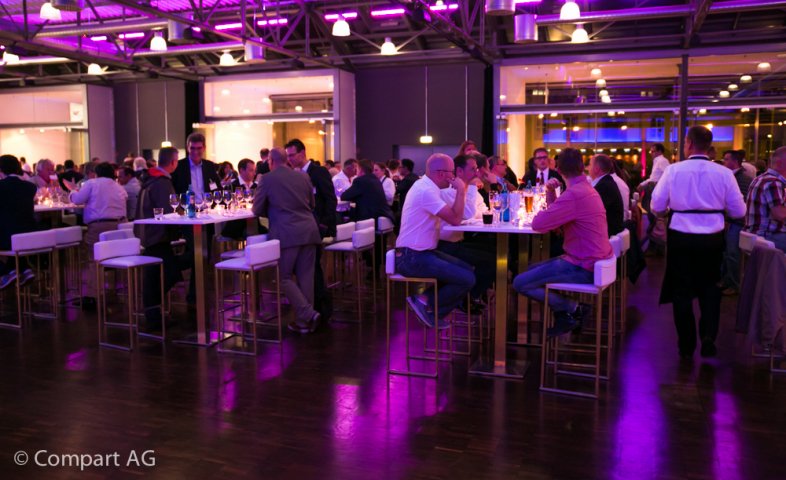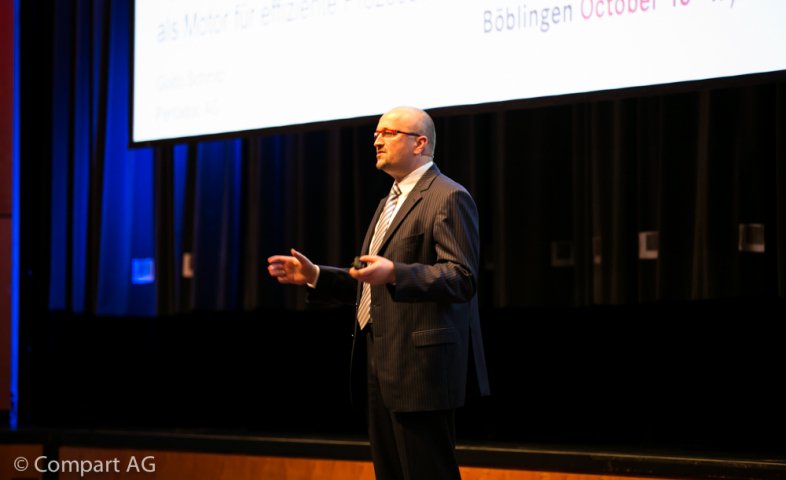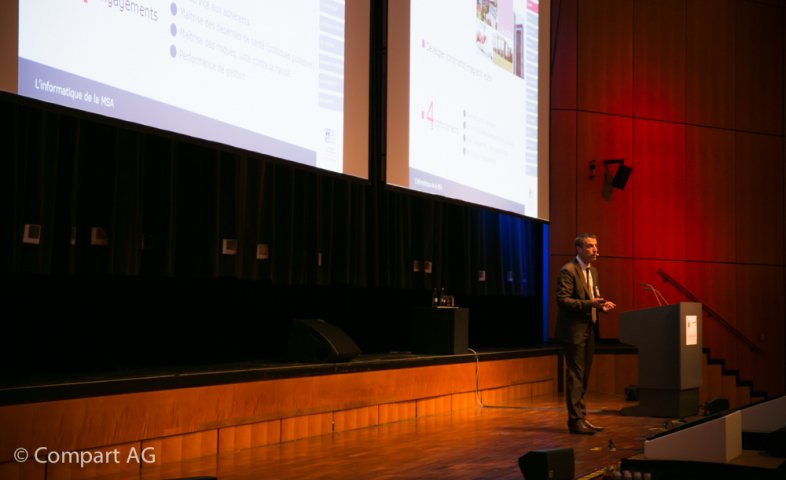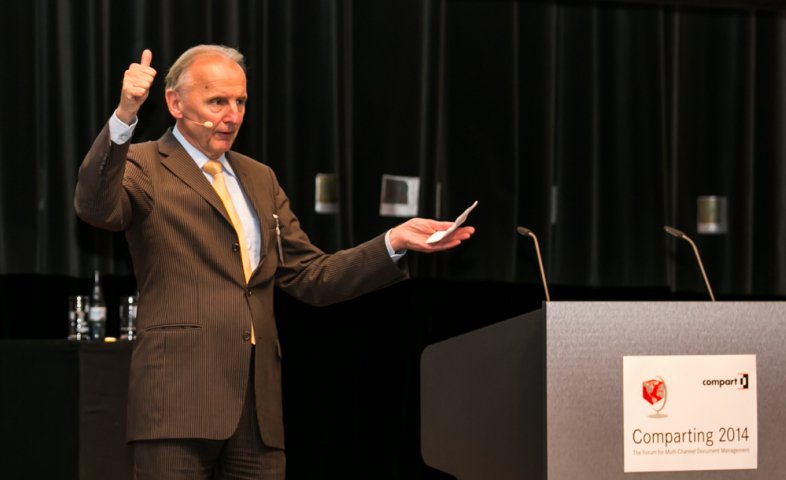
International forum for innovative document and output management sets a clear course for multi-channel customer communications.
There are still mountains to climb toward modern customer communication. That is the essential takeaway from the two-day Comparting Forum in the Böblingen Kongresshalle that concluded today. With approximately 370 attendees from Germany and abroad, the forum for innovative document and output management hosted by Compart was the best attended yet.
In this its 10th anniversary year, Comparting focused on the question of what happens now that the business world is fully engaged in the transition from purely physical to multi-channel delivery. Harald Grumser, founder, co-owner, and CEO of Compart, explained why, in light of the growing role of the Internet and mobile end devices in document processing, page- and device-independent document display and output lie at the heart of communications of the future.
The fact is that separating data from layout is inevitable. Grumser maintains that, more than ever, transmissible content must be adapted to the output channel. PDF has turned out to be an unhappy fit with smartphones and tablet displays. Users do, however, continue to favor the PDF format with its traditional and familiar A4 display. Yet the standard 21 x 29.7 cm page no longer works everywhere, which is why traditional channels oriented to A4 are being superseded by format-independent media. In Grumser's view, HTML5 is the format of the future. In this context he also spoke of a coexistence of data and documents, which was the thematic thread that ran through the entire conference.
Paper remains an important delivery method
Against this backdrop, participants were keen to learn more about the latest version of DocBridge Mill Plus, released at the beginning of October just before Comparting. Version 2.2 enables companies to leverage their legacy IT infrastructure and process documents regardless of type, format, content and source so they can be output over all physical and electronic channels. This function is technologically based on a component that generates HTML files. Moreover, Compart's solution supports the generation of XMP metadata, further advancing the automation of digital document exchange.
Yet automatic downstream processing of data is just one aspect of modern output management. Even more fundamental is restructuring customer communication, as pointed out in the keynote by Carsten Hinze of the renowned consulting firm, Porst and Steiner. With the pull and tug of changing customer behavior, new technical possibilities, and increasing legal obligations, various challenges arise that are difficult to meet using conventional approaches. Customers today communicate multimedially and expect companies to respond more quickly, according to Hinze. Mobile channels play a key role. He noted that this naturally affects document dispatch, thus indirectly shoring up the thesis that the future lies in readying documents for every type of physical and electronic channel when they are being created.
Hinze did affirm that paper would remain an important delivery method, especially for haptically and optically premium documents as well as sensitive documents. Therefore so-called hybrid solutions that equally support physical and electronic channels as needed have an important role to play.
Peaceful coexistence between physical and digital communication
The presentation from Swiss Post Solutions (SPS) confirmed that both digital and physical communication have their place. The fully owned subsidiary of Swiss Post is a leading supplier of business process solutions. One of its main areas of activity is multi-channel document output. While bringing paper documents into the electronic age (e.g., Web portals, e-mail, secure mail) is one focus of SPS, the volume of physical output continues to mount at five European locations. Over 600 million physical mailings leave SPS locations each year. And the trend is growing. Andreas Keck, Director of Solution Sales & Client Management at SPS, explained that this growth trend was also connected to companies' willingness to outsource their document logistics.
In that regard, Dr. Frank Wermeyer, who is helping Swiss Post implement IncaMail service, discussed with the audience the extent to which secure mail solutions represent an alternative or simply a complement to the traditional letter. In his presentation, he posed the question: “To what degree do solutions like De-Mail and E-Postbrief really meet companies' expectations of a secure and simultaneously efficient delivery method?” Audience reactions clearly indicated that this would remain a hotly debated topic.
Pentadoc market analyst Guido Schmitz maintained that in the final analysis, customer communication per se should not be understood as a driver for repositioning a business. He pointed out the success factors of information logistics and made clear that projects should not be based on purely technical requirements or set up in a departmental silo. He recommended a holistic view of the business processes involved and their organizational and technical requirements.
More international than ever
That fact was also evident in the presentations from renowned companies such as Williams Lea, VHV, Canon, ERGO Insurance Group, Swiss Post Solutions and Mutualité Sociale Agricole (MSA), the French social welfare protection fund. Different aspects of document processing were highlighted, and the approaches to solutions clearly reflected the current trends and challenges. That was reason enough for many participants to think about optimizing their own business processes even more. One issue clearly emerged as a typical source of stress in the industry: ensuring document quality in the face of mounting compliance guidelines.
The mix of presentations on strategic principles and real-world user reports reaffirmed Comparting's value for this 10th anniversary. At least that was the consensus of the auditorium. Several things were clear. With all the nuances and differences between industries, countries, and IT structures, the challenges facing customer communication of the future are universal and similar in all countries and regions -- certainly one reason why the percentage of foreign visitors at the forum has grown steadily since 2005. This prompted Compart to offer a special track of topics especially for France, a focus market for Compart in addition to the German-speaking and northern European countries. Francophone interest in these sessions was equally strong, with the presentation by MSA being the clear high point. In another presentation, Philippe Filippi, Compart's regional manager for southern Europe, explained how industry standards are changing, if not revolutionizing, document processing.
Media presence was likewise international. Journalists from Germany, Austria, France and Spain took part in a press conference with the CEO and regional managers from Compart to learn about the latest trends and challenges in document and output management.
Participants appreciate exchange of experiences and ideas
The participants also had plenty of opportunity to share ideas and experiences. In fact, the appeal of the forum lies in the opportunity to talk with analysts, renowned companies, high-profile speakers, and of course Compart management in a relaxed atmosphere. The "Babylonian babble" in the Böblinger Kongresshalle was eloquent evidence of that fact.
And that wasn't the only networking opportunity. For those unable to tear themselves away from the riveting daytime program, the evening event provided yet another occasion.
To conclude Comparting, well-known neuroscientist Professor. Dr. Uwe Genz engrossed the participants even more when he challenged them with the latest findings on learning and memory techniques. The researcher maintains that mental fitness is not an unalterable trait that remains fixed over a lifetime, a claim that offered food for thought to many in the audience. Genz' theories provided rich conversational material even after the official close of the conference.
Once again, Comparting proved itself a significant innovation driver for the industry. Many visitors have already confirmed their attendance at Comparting 2015.
The next Comparting will be hold October 15-16, 2015.

